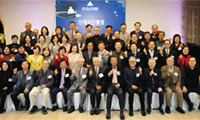
Water, an abundant resource in Tajikistan, irrigates endless cotton fields, like this one worked by sharecroppers.
By DAVID L. STERNNUREK, Tajikistan - The inscription just above a tunnel at the foot of the colossal Nurek hydropower dam in south central Tajikistan is succinct: “Water Is Life. The frigid, frothing Vakhsh River rushing under it adds a visual punctuation mark.
In Tajikistan, the source of more than 40 percent of Central Asia’s water, this is no mere platitude. The mountainous state lacks the industry and natural riches that bless other former Soviet Central Asian republics. Water is one of the few resources the country possesses in great abundance.
For this reason, President Emomali Rakhmon has pinned Tajikistan’s economic hopes - and perhaps even its continued political existence -on developing its hydropower potential.
Three projects are either under construction or being considered, including Rogun, a gargantuan structure farther up the Vakhsh River. Tajik officials say they have hopes of building more than 20 hydroelectric plants and dams.
But a number of hurdles must be surmounted before the plans for a great hydropower future can be realized. Tajikistan is in an earthquake zone and the dams must be built to withstand major seismic shocks. Officials are expected to conduct environmental impact studies to determine whether any flora or fauna will be threatened.
The Tajik government is also heavily in debt and must find heavy foreign investment to build the dams. Recently, China agreed to build a $300 million hydroelectric power plant, Nurobad-2, with a capacity of 160 to 220 megawatts. But Tajik officials say Rogun alone will cost up to $3.2 billion.
And the region’s complicated water politics, where upstream and downstream countries have diametrically opposed needs and aims, threaten to intensify.
Here, water irrigates endless fields of cotton, one of the main sources of income in this primarily agricultural land. Nurek - the world’s highest dam, at 300 meters, and a prestige project of the Soviet Union - is the difference between light and darkness, heat and no heat, for the majority of Tajikistan’s seven million inhabitants, supplying nearly all the country’s energy needs. It also provides cheap electricity to power the Talco aluminum plant, the nation’s largest industrial enterprise.
Rogun, as it is now envisioned, would surpass Nurek’s height by more than 30 meters.
Though for the moment it seems to be managing, Tajikistan threatens to become a failed state, say Western experts and diplomats, speaking on condition of anonymity because of the delicacy of the issue. The country still has not fully recovered from a devastating civil war a decade ago. State coffers are virtually empty, while the government is viewed as unable to meet basic needs.
The situation was laid bare last winter when prolonged freezing temperatures overloaded the Soviet-era electrical grid, plunging the entire country into cold and darkness. For Western officials working in Tajikistan, the emergency was a disturbing revelation of the government’s dysfunction.
“The crisis was not caused by the winter weather, said an official of an American nongovernmental organization, who spoke on condition of anonymity because he was not authorized to speak to the news media. “The crisis was triggered by the winter weather, but caused by chronic mismanagement.
All of Tajikistan’s power troubles will be remedied by the dam projects, the Rakhmon government hopes. They will not only provide for all of Tajikistan’s energy needs but also allow the country to export power to neighboring countries.
“It’s a good idea - hydropower is one of the few resources that Tajikistan can exploit,” said John Morgan, an official with Usaid, the American assistance program, and a power specialist. “Power lines could go to Afghanistan and Pakistan, which are both energy-starved countries, and to the rest of Central Asia as well.”
Rogun, for example, will generate about 13 billion kilowatt hours per year, more than 80 percent of the country’s average consumption, officials at the construction site say. In the short term, Sangtuda-1, a hydropower plant that began operating last winter, will take on some of the country’s electrical heavy lifting, though its introduction failed to resolve the electricity crisis.
But outside investors are leery. While individual investors who are more accepting of risk may materialize, international donor organizations and banks have become more circumspect with Tajikistan. Besides the dysfunction and corruption revealed by the winter crisis, the International Monetary Fund recently announced that Tajikistan had misreported its finances six times over the last decade, an I.M.F. record. President Rakhmon has asked Tajiks to voluntarily forfeit a month’s wages, or about $10 million, to finance the initial building stage.
“I urge all the patriots and sons of our land to take active part in constructing the first phase of the plant and add your contribution to the country’s energy independence,” he said.
Water issues must also be resolved. Central Asia’s disagreements over how to allocate water resources resemble the Middle East’s in their complexity and potential for conflict. Downstream countries, most prominently Uzbekistan, have steadfastly opposed Tajikistan’s hydroelectric plans. The two countries are engaged in an undeclared cold war, Western diplomatic analysts say.
The Uzbeks, who need to provide for their expansive and inefficiently irrigated cotton fields, say that the dams will disturb the water cycle, withholding water in the summer when it is needed and releasing it in the winter for electricity.
Tajik authorities say that the opposite will be true and that the dams will better regulate water distribution: water will be held in the winter and released in the summer. Other analysts say that the Uzbeks, who supply electricity to Tajikistan, fear they will lose leverage over their neighbors.
“The thing is, the more dams, the more control the Tajiks will have over the water, and that’s what the Uzbeks are afraid of,” said one Western diplomat in the capital, Dushanbe.
스마터리빙
more [ 건강]
[ 건강]이제 혈관 건강도 챙기자!
[현대해운]우리 눈에 보이지 않기 때문에 혈관 건강을 챙기는 것은 결코 쉽지 않은데요. 여러분은 혈관 건강을 유지하기 위해 어떤 노력을 하시나요?
 [ 건강]
[ 건강]내 몸이 건강해지는 과일궁합
 [ 라이프]
[ 라이프]벌레야 물럿거라! 천연 해충제 만들기
 [ 건강]
[ 건강]혈압 낮추는데 좋은 식품
[현대해운]혈관 건강은 주로 노화가 진행되면서 지켜야 할 문제라고 인식되어 왔습니다. 최근 생활 패턴과 식생활의 변화로 혈관의 노화 진행이 빨라지고
사람·사람들
more
[송년행사 화보] “이웃과 함께 나누고 지인과 함께하니 행복”
KYCC13일 윌튼 플레이스 초등학교에서 열린 ‘한인타운청소년회관(KYCC) 홀리데이 카니발’이 성황리에 막을 내렸다. 올해는 KYCC 창립 …

[송년행사 화보] “ ‘손에 손잡고’ 한 해 마무리… 건강과 행복 기원”
전주고·북중남가주 전주고·북중 총동창회(회장 백규종)의 2025년 정기총회 및 송년회가 지난 14일 LA 작가의 집에서 성황리에 열렸다. 이날…
[송년행사 화보] “한 해를 마무리하며… 화기애애…
LA 러너스클럽LA 러너스클럽(회장 김두병)은 13일 작가의 집에서 80여명의 회원과 가족이 참석한 가운데 송년회를 마쳤다. 2007년 창립된…
[송년행사 화보] “웃음과 감사 가득 ‘훈훈’… …
한국학교총연합회미주한국학교총연합회(회장 이영숙)가 주최한 제43회 장기 근속교사 포상 및 송년의 밤 행사가 140여명의 교사들이 참석한 가운데…
[송년행사 화보] “친구야 반갑다… 선배님들 모두…
경남중고경남중·고등학교 남가주 동창회(회장 예해덕)는 지난 6일 송년회를 열고 동문 및 가족 60여 명이 참석한 가운데 끈끈한 우정을 확인했다…
많이 본 기사
- 엔비디아·구글·오픈AI 등 빅테크들, 美 ‘제네시스 미션’ 합류
- 브라운대 총격 용의자 특정…MIT 교수 살해 연관성도 수사
- “다카이치, 中갈등 속 내년 봄 美서 트럼프와 회담 추진”
- 상설특검, ‘관봉권 폐기’ 확인차 한국은행 수색…첫 강제수사
- ‘주한미군 일방감축 견제’ 부활한 2026년도 美국방수권법 발효
- 尹 ‘이종섭 호주도피 사건’ 내달 14일(한국시간) 재판 시작…첫 준비기일
- 한국연극배우협회 “윤석화 별세 사실 아냐”…보도자료 정정·사과
- 챗GPT 앱, 출시 31개월 만에 누적결제액 30억달러
- 독이 된 박나래 영상..문장 끝 꾹 닫힌 입까지 분석 “리스크 관리 최대”
- 트럼프, 대마초 규제 완화…헤로인과 같은 1급서 3급으로 하향
- 에어 프레미아 취항, 기대 컸나
- ‘AI 인프라구축 속도전’ 위한 인허가 개편 법안, 하원 통과
- 경찰, ‘통일교 금품수수 의혹’ 전재… 1
- 중고차 주행거리 조작 ‘주의보’
- 워싱턴DC 대표 공연장 케네디센터 명칭 ‘트럼프-케네디센터’로
- 美·英 10대소년 유가족, 메타 상대 소송… “미성년 성착취 방치”
- 보건부, 미성년자 성전환 의료 차단 추진… “자금지원 중단”
- 위기의 트럼프 “내년봄 최대규모 세금… 1
- LA산불 여파 ‘심각’ 지역 주민 건강악화
- ‘무려 94.2%’ 안세영 새 역사 썼다, 역대 단일 시즌 ‘女 최고 승률’
- ‘브라운대 총기참사’ 뉴욕 한인학생도 총상
- 크리스마스 연휴 겨울폭풍 남가주 연안 2~4인치 비
- 기아 텔루라이드, 뉴스위크 선정 ‘2026년 가장 기대되는 신차’ 리스트 등재
- 변정수, 갑상선암→성대결절 고백 “거의 죽음을 경험했다”
- 尹, 계엄군 장성들에 “미안”…계엄엔… 1
- 노스캐롤라이나주 공항서 商用항공기 추락… “7명 사망”
- 워싱턴 일원 소비 확 줄어들었다
- LA 소파이 스테디엄 8경기 확정
- 트럼프 “차기 연준 의장 몇주내 발표…3∼4명과 얘기 중”
- 방미 위성락 “진전있었다…정상합의 후속조치 서두르기로”
- 67명 숨진 워싱턴 여객기·軍헬기 충돌에 정부 ‘책임 인정’
- 브라운대 한인학생, 총격참사 극적 생존
- 거래 더디지만 균형 회복… 리얼터닷컴 내년 주택시장 전망
- 어느덧 20주년.. ‘5남매 가족’ 이동국♥이수진, 세월 잊은 비주얼
- 2026년형 기아 쏘렌토, 2025 IIHS충돌 평가 최고 등급(TOP SAFETY PICK+) 획득
- “김혜성만큼은 받지 않을까” 송성문 포스팅 D-3, ML 스카우트도 낙관했다
- 트럼프, 사이버안보 총괄 NSA국장에 조슈아 러드 지명
- 뱅크오브호프, 규모도 1위·봉사활동도 ‘으뜸’
- 미일, ‘日 5천500억 달러 대미… 1
- 구글-메타, 엔비디아 독주 막으려 ‘오월동주’…AI칩 SW개발 협력
- “왜 한국 자산 미국으로 옮겨야 하나… 1
- “보이스피싱 이렇게 당한다”
- ‘라도♥’ 에이핑크 윤보미, 손편지로 결혼 발표..9년 열애 결실 “함께하기로”
- “판공비 1만달러 전액 반환하겠다” 3
- 11월 소비자물가 2.7%↑ 선방했지만… “자료부족해 구멍숭숭”
- 월드컵 방문객 ‘미국행’… 한국선 ESTA(전자 여행 허가서)로 입국 가능
- “북VA 주택시장 가격 급등 없다”
- [윌셔에서] 잠시 멈추어 서서
- 한국 축구, 태백산급 고지대 난관… “손흥민 감아차기도 제동”
- “연방 전기차 충전 인프라 지원 중단은 위법”
1/5지식톡

-
 ☝️해외에서도 가능한 한국어 선생님…
0
☝️해외에서도 가능한 한국어 선생님…
0이 영상 하나면 충분합니다!♥️상담신청문의♥️☝️ 문의 폭주로 '선착순 상담'만 진행합니다.☎️ : 02-6213-9094✨카카오톡ID : @GOODEDU77 (@골뱅이 꼭 붙여주셔야합니다…
-
 테슬라 자동차 시트커버 장착
0
테슬라 자동차 시트커버 장착
0테슬라 시트커버, 사놓고 아직 못 씌우셨죠?장착이 생각보다 쉽지 않습니다.20년 경력 전문가에게 맡기세요 — 깔끔하고 딱 맞게 장착해드립니다!장착비용:앞좌석: $40뒷좌석: $60앞·뒷좌석 …
-
 식당용 부탄가스
0
식당용 부탄가스
0식당용 부탄가스 홀세일 합니다 로스앤젤레스 다운타운 픽업 가능 안녕 하세요?강아지 & 고양이 모든 애완동물 / 반려동물 식품 & 모든 애완동물/반려동물 관련 제품들 전문적으로 홀세일/취급하는 회사 입니다 100% …
-
 ACSL 국제 컴퓨터 과학 대회, …
0
ACSL 국제 컴퓨터 과학 대회, …
0웹사이트 : www.eduspot.co.kr 카카오톡 상담하기 : https://pf.kakao.com/_BEQWxb블로그 : https://blog.naver.com/eduspotmain안녕하세요, 에듀스팟입니다…
-
 바디프렌드 안마의자 창고 리퍼브 세…
0
바디프렌드 안마의자 창고 리퍼브 세…
0거의 새제품급 리퍼브 안마의자 대방출 한다고 합니다!8월 23일(토)…24일(일) 단 이틀!특가 판매가Famille: $500 ~ $1,000Falcon: $1,500 ~ $2,500픽업 & 배송직접 픽업 가능LA…
케이타운 1번가
오피니언
 수잔 최 한미가정상담소 이사장 가정법 전문 변호사
수잔 최 한미가정상담소 이사장 가정법 전문 변호사 [수잔 최 변호사의 LIFE &] AI 시대 편리함에 안주하지 말자
 김도년 성균관대 건축학과 교수 스마트도시·건축학회장
김도년 성균관대 건축학과 교수 스마트도시·건축학회장 [로터리] 지멘스가 만드는 미래 동네

[여명] 금붕어를 키우는 오지선다형 수능
 허경옥 수필가
허경옥 수필가 [윌셔에서] 잠시 멈추어 서서
 양홍주 / 한국일보 논설위원
양홍주 / 한국일보 논설위원[지평선] 판다 없는 일본

[왈가 왈부] 쿠팡 김범석 “글로벌 CEO라 불출석”… ‘맹탕’ 청문회 불보듯
 정숙희 논설위원
정숙희 논설위원칠레에서 영국까지, 27년을 걷다
 마크 A. 시쎈 / 워싱턴포스트 칼럼니스트
마크 A. 시쎈 / 워싱턴포스트 칼럼니스트 [마크 A. 시쎈 칼럼] MAGA와 ‘힘에 바탕한 외교정책’
 김동찬 시민참여센터 대표
김동찬 시민참여센터 대표 [미국은 지금] 위기의 시대, 사회안전망은 최후의 방어선이다
1/3지사별 뉴스

‘브라운대 총기참사’ 뉴욕 한인학생도 총상
▶총상 입은 상황서도 동료학생 의식 잃지않도록 도와 ▶부친도 동문 “우리 가족에게 고통스러운 일”지난 13일 발생한 브라운대학교 총기난사(본보…
뉴욕주 안락사 합법화 초읽기 호쿨, “안전장치 마련되면 서명”

워싱턴 일원 소비 확 줄어들었다
올해 8월 워싱턴DC에 범죄와의 전쟁을 명분으로 주방위군이 본격적으로 배치된 가운데, 이 시기 이후부터 버지니아와 메릴랜드, DC 등 워싱턴 …
“북VA 주택시장 가격 급등 없다”

베이지역 스포츠팀, SF 한인회에 후원금
샌프란시스코 베이지역 한인회(회장 김한일)는 한인 메이저리거 이정후 선수의 소속팀인 샌프란시스코 자이언츠(San Francisco Giants…
불자커뮤니티 20일 청소년발표회및 송년회

오늘 하루 이 창 열지 않음 닫기 



















































.png)


댓글 안에 당신의 성숙함도 담아 주세요.
'오늘의 한마디'는 기사에 대하여 자신의 생각을 말하고 남의 생각을 들으며 서로 다양한 의견을 나누는 공간입니다. 그러나 간혹 불건전한 내용을 올리시는 분들이 계셔서 건전한 인터넷문화 정착을 위해 아래와 같은 운영원칙을 적용합니다.
자체 모니터링을 통해 아래에 해당하는 내용이 포함된 댓글이 발견되면 예고없이 삭제 조치를 하겠습니다.
불건전한 댓글을 올리거나, 이름에 비속어 및 상대방의 불쾌감을 주는 단어를 사용, 유명인 또는 특정 일반인을 사칭하는 경우 이용에 대한 차단 제재를 받을 수 있습니다. 차단될 경우, 일주일간 댓글을 달수 없게 됩니다.
명예훼손, 개인정보 유출, 욕설 등 법률에 위반되는 댓글은 관계 법령에 의거 민형사상 처벌을 받을 수 있으니 이용에 주의를 부탁드립니다.
Close
x